Advanced Cognitive Behavioural Therapy (CBT) Diploma
Advanced Cognitive Behavioural Therapy (CBT) Course
PLEASE NOTE: Completion of this course does not qualify you as a professional CBT therapist. It is designed for anyone who is interested in learning more about cognitive behavioural therapy.
Cognitive Behavioural Therapy (CBT) is a popular therapy paradigm that is used in the treatment of depression, anxiety, eating disorders, relationship problems and other causes of psychological distress.
It is widely available on the NHS and there are many professional opportunities for those with qualifications in this field.
This course provides further information and practical guidance for those who are already familiar with the basic ideas and implementation of CBT and are looking to further extend their knowledge.
You Will Learn:
- The theory behind Cognitive Behavioural Therapy (CBT), its indications and its contraindications.
- The basics of behavioural neuroscience, the link between the nervous system and behaviour and how a grounding in this field will help you become a more effective CBT practitioner.
- The key ideas underlying three distinct types of CBT therapy – Acceptance and Commitment Therapy (ACT), Behavioural Therapy (BT), and Cognitive Analytic Therapy (CAT) – and an overview of the techniques used by practitioners of each approach.
- How CBT practitioners approach the therapy process and how they make use of materials that guide them in helping their clients make positive changes to their lives.
- How CBT-E, a special type of CBT developed for use in patients with eating disorders, works in treating eating disorder symptoms and preventing relapse.
- How CBT can be used to improve mood in people with depression and why cognitive distortions are the key to understanding depression.
- How CBT provides individuals with a set of skills that help reduce their stress levels and risk of burnout, how it can be used to cure anxiety disorders, and why it is a good treatment option for insomnia.
- Why relationship difficulties are so common, how couples and families become locked in dysfunctional patterns of relating to one another, and how CBT practitioners can help them take a healthier approach to their relationships.
- What is meant by the term “addiction”, the factors that maintain an addiction, and how a well-structured CBT programme can break the cycles that keep the addiction going.
- What to consider when embarking on a career as a therapist, including how to choose between private sector and public sector practice and how to meet your obligations under the law.
Benefits of Taking This Course:
- You will learn about the cognitive, emotional, behavioural and neurological aspects of psychological distress.
- You will gain insight into several mental illnesses, including their causes and symptoms. This will be useful if you work, or wish to work, with clients or patients experiencing these problems.
- You will discover how human behaviour is governed by external and internal factors, which will help you make sense of other people’s behaviour both at home and at work.
- Your knowledge of CBT practices will stand you in good stead for a career in the helping and medical professions.
- You can study from any location with an internet connection.
- Learn the material at any time and at your own pace.
- Lifetime access to the course – no deadlines.
- Obtain a recognised certification when completing the course, which will improve your career prospects.
This course includes
24/7 Student Support
End of course certification
Lifetime access to your course
Compatible with modern devices
- The basic principles of CBT, including the interaction between thoughts, feelings and behaviours.
- A brief history of CBT and how the first pioneers developed their theories and techniques.
- The problems that can be addressed using CBT, the populations that benefit from it and why it is not suitable for everyone.
- The main methods used by CBT practitioners and the role of the therapeutic relationship in CBT.
- Why CBT practitioners benefit from acquiring a basic knowledge of behavioural neuroscience.
- The key concepts behind behavioural neuroscience and how it helps us understand the actions of both well and mentally ill individuals.
- How noradrenaline affects human behaviour.
- The role of dopamine in human behaviour.
- An overview of Acceptance Commitment Therapy (ACT) and its philosophical foundations.
- ACT techniques used by practitioners in the treatment of psychological disorders.
- An overview of Behavioural Therapy (BT).
- The applications of BT and how it can help clients facing a range of problems.
- How CBT therapists use manuals to guide them through the therapy process.
- What is meant by the term 'case formulation'.
- Three common approaches to case formulation.
- How to use psychometric tests and assessments when administering CBT.
- What is meant by the term “eating disorder”.
- The types of eating disorder seen most often in therapeutic practice and the symptoms of each.
- The thoughts, behaviours and feelings usually seen in eating disorders.
- CBT interventions that are effective in conquering the maladaptive patterns underlying eating disorders.
- What is meant by the term 'depression' and how it is diagnosed.
- How the CBT paradigm makes sense of depression.
- The cognitive distortions and maladaptive behaviours that maintain a state of depression.
- CBT interventions that can lift depression.
- What is meant by the term “stress”.
- Why people become stressed and the symptoms of stress and burnout.
- CBT Interventions for Stress Alleviation
- What is meant by the term “anxiety” and the CBT interventions most often used by practitioners to help an anxious client.
- Why relationship difficulties are so common.
- Why a couple may seek out CBT.
- How a CBT practitioner can work with a couple to uncover underlying problems in how they communicate with one another.
- Why an individual or single person might seek out CBT to help improve their relationships.
- What is meant by the term “addiction”.
- The most common forms of addiction treated by CBT practitioners.
- How addiction is conceptualised in CBT and how thoughts maintain addiction behaviours.
- How a CBT therapist structures an addiction intervention therapy programme.
- How to pursue formal training as a CBT therapist.
- The key considerations to bear in mind when deciding whether to work in the private sector, the public sector, or both.
- How to promote your services as a private therapist.
- How to meet your legal obligations with regards to insurance, tax and supervision.
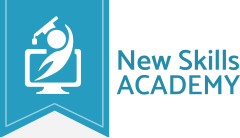 ID: YDFT67YHJ
ID: YDFT67YHJ
of achievement
This certificate is presented to
Your Name

For completing the
Advanced Cognitive Behavioural Therapy (CBT) Diploma
on 21st November 2025
Selena Hurford
Selena Hurford
Course Tutor

Daniel Morgan
Daniel Morgan
Head of Academy
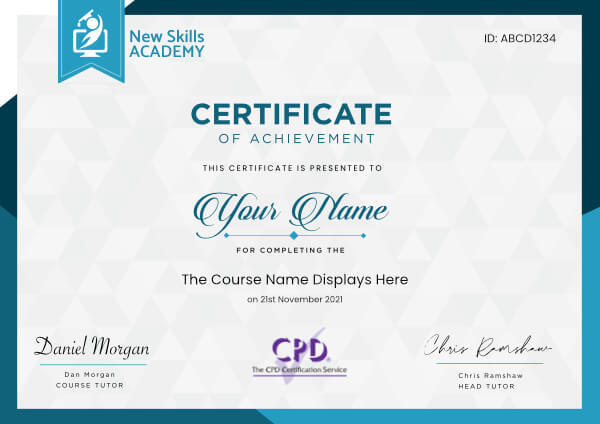
Anyone who has an interest in learning more about this subject matter is encouraged to take the course. There are no entry requirements to take the course.
The course is broken down into 10 individual modules. Each module takes between 20 and 90 minutes on average to study. Although you are free to spend as much or as little time as you feel necessary on each module, simply log in and out of the course at your convenience.
You can study the course any time you like. Simply log in and out of the web based course as often as you require. The course is compatible with all computers, tablet devices and smart phones so you can even study while on the move!
Once you have completed all 10 modules there is a multiple choice test. The questions will be on a range of topics found within the 10 modules. The test, like the course, is online and can be taken a time and location of your choosing.
The pass mark for the test is 70%.
If you don’t pass the test first time you will get further opportunities to take the test again after extra study. There are no limits to the number of times you can take the test. All test retakes are included within the price of the course.
Once you have completed your test you can log in to your account and download/print your certificate any time you need it. If you would prefer us to post you a certificate to a UK address, there will be an admin charge of £10 (certificates sent internationally may cost more).
You can either use your Visa, MasterCard, American Express, Solo cards or PayPal account to pay for the online course. Our site uses the latest SSL encryption to ensure your safety. All payments are handled securely by PayPal.
You can begin the course immediately after your payment has been received. You will create your login details during the checkout process. We will also send you an email confirming your login details.
We estimate that the course will take about 15 hours to complete in total, plus an additional 30 minutes for the end of course test.
Once you have been awarded your certificate it is valid for life. The certificate does not expire or need renewing.
Absolutely fantastic! I would definitely recommend doing this course if you are a beginner, and I would also say that you definitely do not have to worry as all three learning types are covered! It is also great to have the ability to get in touch with a tutor if stuck, especially if you haven’t got someone at home or work to help you understand something!
If I hadn’t of already completed this course and chosen to start the next level up, I would happily do this course again. However, I would recommend this course, even more so for someone who is trying to learn for a career change! Exactly what I did and because of this very reason, and feared that it would expensive to change my career, and was amazed how easy and cheap it was!

Korin Williams
Helpful tips learned during the course and many fun facts. I will be completing 6 more courses after this one. Such a great learning experience. The knowledge in each package is phenomenal!
Each course is broken down into modules to make it easy to break down the course for short breaks and as soon as you sign back in again it remembers where you left off in your course. How clever!
I would highly recommend this course to anyone looking to brush up their knowledge and skills. Best of luck!
100% Recommended. New Skills Academy is the best!

Dora Christou
This course thoroughly improved my knowledge of Microsoft Outlook. I found the modules on meetings, appointments and tasks the most informative. I’m sure these will all have a direct impact on my day to day working life.
If you do not already have a basic understanding of Outlook then the first few modules in particular will be very helpful to you as they cover the fundamentals extremely well.
There is also more advanced options for those who are at that level.
The course is very easy to follow, the tutorial videos are extremely well put together and you can learn at your own pace.

Jordan Grierson
Enrolled in Legal Secretary Diploma course and absolutely love it! The course is well laid out, easy to follow at any pace and is full of information that is fit for the purpose. I can fit learning around my work and family life. I wish I had started sooner!

Rachida Zahouani
I was worried that I wouldn't be able to manage this my course and work. But to my surprise and comfort this course is set out so well I find I'm enjoying learning again and look forward to putting my studying into practice in my future job role....it's brilliant !!!!

Marie Whitfield
Very Informative course, breaks everything down easily into simple steps.Thank you.

Nicola Hovell
Advanced Cognitive Behavioural Therapy (CBT) Course
PLEASE NOTE: Completion of this course does not qualify you as a professional CBT therapist. It is designed for anyone who is interested in learning more about cognitive behavioural therapy.
Cognitive Behavioural Therapy (CBT) is a popular therapy paradigm that is used in the treatment of depression, anxiety, eating disorders, relationship problems and other causes of psychological distress.
It is widely available on the NHS and there are many professional opportunities for those with qualifications in this field.
This course provides further information and practical guidance for those who are already familiar with the basic ideas and implementation of CBT and are looking to further extend their knowledge.
You Will Learn:
- The theory behind Cognitive Behavioural Therapy (CBT), its indications and its contraindications.
- The basics of behavioural neuroscience, the link between the nervous system and behaviour and how a grounding in this field will help you become a more effective CBT practitioner.
- The key ideas underlying three distinct types of CBT therapy – Acceptance and Commitment Therapy (ACT), Behavioural Therapy (BT), and Cognitive Analytic Therapy (CAT) – and an overview of the techniques used by practitioners of each approach.
- How CBT practitioners approach the therapy process and how they make use of materials that guide them in helping their clients make positive changes to their lives.
- How CBT-E, a special type of CBT developed for use in patients with eating disorders, works in treating eating disorder symptoms and preventing relapse.
- How CBT can be used to improve mood in people with depression and why cognitive distortions are the key to understanding depression.
- How CBT provides individuals with a set of skills that help reduce their stress levels and risk of burnout, how it can be used to cure anxiety disorders, and why it is a good treatment option for insomnia.
- Why relationship difficulties are so common, how couples and families become locked in dysfunctional patterns of relating to one another, and how CBT practitioners can help them take a healthier approach to their relationships.
- What is meant by the term “addiction”, the factors that maintain an addiction, and how a well-structured CBT programme can break the cycles that keep the addiction going.
- What to consider when embarking on a career as a therapist, including how to choose between private sector and public sector practice and how to meet your obligations under the law.
Benefits of Taking This Course:
- You will learn about the cognitive, emotional, behavioural and neurological aspects of psychological distress.
- You will gain insight into several mental illnesses, including their causes and symptoms. This will be useful if you work, or wish to work, with clients or patients experiencing these problems.
- You will discover how human behaviour is governed by external and internal factors, which will help you make sense of other people’s behaviour both at home and at work.
- Your knowledge of CBT practices will stand you in good stead for a career in the helping and medical professions.
- You can study from any location with an internet connection.
- Learn the material at any time and at your own pace.
- Lifetime access to the course – no deadlines.
- Obtain a recognised certification when completing the course, which will improve your career prospects.
This course includes
24/7 Student Support
End of course certification
Lifetime access to your course
Compatible with modern devices
- The basic principles of CBT, including the interaction between thoughts, feelings and behaviours.
- A brief history of CBT and how the first pioneers developed their theories and techniques.
- The problems that can be addressed using CBT, the populations that benefit from it and why it is not suitable for everyone.
- The main methods used by CBT practitioners and the role of the therapeutic relationship in CBT.
- Why CBT practitioners benefit from acquiring a basic knowledge of behavioural neuroscience.
- The key concepts behind behavioural neuroscience and how it helps us understand the actions of both well and mentally ill individuals.
- How noradrenaline affects human behaviour.
- The role of dopamine in human behaviour.
- An overview of Acceptance Commitment Therapy (ACT) and its philosophical foundations.
- ACT techniques used by practitioners in the treatment of psychological disorders.
- An overview of Behavioural Therapy (BT).
- The applications of BT and how it can help clients facing a range of problems.
- How CBT therapists use manuals to guide them through the therapy process.
- What is meant by the term 'case formulation'.
- Three common approaches to case formulation.
- How to use psychometric tests and assessments when administering CBT.
- What is meant by the term “eating disorder”.
- The types of eating disorder seen most often in therapeutic practice and the symptoms of each.
- The thoughts, behaviours and feelings usually seen in eating disorders.
- CBT interventions that are effective in conquering the maladaptive patterns underlying eating disorders.
- What is meant by the term 'depression' and how it is diagnosed.
- How the CBT paradigm makes sense of depression.
- The cognitive distortions and maladaptive behaviours that maintain a state of depression.
- CBT interventions that can lift depression.
- What is meant by the term “stress”.
- Why people become stressed and the symptoms of stress and burnout.
- CBT Interventions for Stress Alleviation
- What is meant by the term “anxiety” and the CBT interventions most often used by practitioners to help an anxious client.
- Why relationship difficulties are so common.
- Why a couple may seek out CBT.
- How a CBT practitioner can work with a couple to uncover underlying problems in how they communicate with one another.
- Why an individual or single person might seek out CBT to help improve their relationships.
- What is meant by the term “addiction”.
- The most common forms of addiction treated by CBT practitioners.
- How addiction is conceptualised in CBT and how thoughts maintain addiction behaviours.
- How a CBT therapist structures an addiction intervention therapy programme.
- How to pursue formal training as a CBT therapist.
- The key considerations to bear in mind when deciding whether to work in the private sector, the public sector, or both.
- How to promote your services as a private therapist.
- How to meet your legal obligations with regards to insurance, tax and supervision.
 ID: YDFT67YHJ
ID: YDFT67YHJ
of achievement
This certificate is presented to
Your Name

For completing the
Advanced Cognitive Behavioural Therapy (CBT) Diploma
on 21st November 2025
Selena Hurford
Selena Hurford
Course Tutor

Daniel Morgan
Daniel Morgan
Head of Academy

Anyone who has an interest in learning more about this subject matter is encouraged to take the course. There are no entry requirements to take the course.
The course is broken down into 10 individual modules. Each module takes between 20 and 90 minutes on average to study. Although you are free to spend as much or as little time as you feel necessary on each module, simply log in and out of the course at your convenience.
You can study the course any time you like. Simply log in and out of the web based course as often as you require. The course is compatible with all computers, tablet devices and smart phones so you can even study while on the move!
Once you have completed all 10 modules there is a multiple choice test. The questions will be on a range of topics found within the 10 modules. The test, like the course, is online and can be taken a time and location of your choosing.
The pass mark for the test is 70%.
If you don’t pass the test first time you will get further opportunities to take the test again after extra study. There are no limits to the number of times you can take the test. All test retakes are included within the price of the course.
Once you have completed your test you can log in to your account and download/print your certificate any time you need it. If you would prefer us to post you a certificate to a UK address, there will be an admin charge of £10 (certificates sent internationally may cost more).
You can either use your Visa, MasterCard, American Express, Solo cards or PayPal account to pay for the online course. Our site uses the latest SSL encryption to ensure your safety. All payments are handled securely by PayPal.
You can begin the course immediately after your payment has been received. You will create your login details during the checkout process. We will also send you an email confirming your login details.
We estimate that the course will take about 15 hours to complete in total, plus an additional 30 minutes for the end of course test.
Once you have been awarded your certificate it is valid for life. The certificate does not expire or need renewing.
Absolutely fantastic! I would definitely recommend doing this course if you are a beginner, and I would also say that you definitely do not have to worry as all three learning types are covered! It is also great to have the ability to get in touch with a tutor if stuck, especially if you haven’t got someone at home or work to help you understand something!
If I hadn’t of already completed this course and chosen to start the next level up, I would happily do this course again. However, I would recommend this course, even more so for someone who is trying to learn for a career change! Exactly what I did and because of this very reason, and feared that it would expensive to change my career, and was amazed how easy and cheap it was!

Korin Williams
Helpful tips learned during the course and many fun facts. I will be completing 6 more courses after this one. Such a great learning experience. The knowledge in each package is phenomenal!
Each course is broken down into modules to make it easy to break down the course for short breaks and as soon as you sign back in again it remembers where you left off in your course. How clever!
I would highly recommend this course to anyone looking to brush up their knowledge and skills. Best of luck!
100% Recommended. New Skills Academy is the best!

Dora Christou
This course thoroughly improved my knowledge of Microsoft Outlook. I found the modules on meetings, appointments and tasks the most informative. I’m sure these will all have a direct impact on my day to day working life.
If you do not already have a basic understanding of Outlook then the first few modules in particular will be very helpful to you as they cover the fundamentals extremely well.
There is also more advanced options for those who are at that level.
The course is very easy to follow, the tutorial videos are extremely well put together and you can learn at your own pace.

Jordan Grierson
Enrolled in Legal Secretary Diploma course and absolutely love it! The course is well laid out, easy to follow at any pace and is full of information that is fit for the purpose. I can fit learning around my work and family life. I wish I had started sooner!

Rachida Zahouani
I was worried that I wouldn't be able to manage this my course and work. But to my surprise and comfort this course is set out so well I find I'm enjoying learning again and look forward to putting my studying into practice in my future job role....it's brilliant !!!!

Marie Whitfield
Very Informative course, breaks everything down easily into simple steps.Thank you.

Nicola Hovell
Why you should study with us
Learn with confidence...
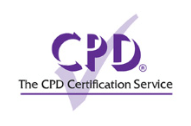
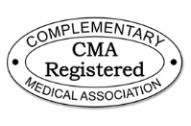
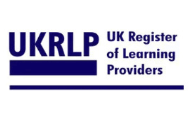


 RRP
£100
RRP
£100
Get a FREE Course
Tick this box to Sign up for our newsletter, and get access to the Interview Skills and CV Writing Certificate course for free! By signing up, you agree to our Privacy Notice & Cookie Policy and to receive marketing and related emails from academy+ brands. You can unsubscribe at any time.As Featured In...
What our students say about us...

This course is a great way to brush up on my rusty excel skills, I recommend this course to anyone looking for something to do during lockdown, it's easy to use and talks you through each stage step by step. It has given me the confidence I need to further my career.
Georgia Darke

I am a doctor. This course is well organized, covering all areas of CBT. The videos and practical tips are very helpful. All the modules are arranged with good explanations and examples. Also each module consists of quick test and assignment which enables you to gain knowledge. Finally I would like to thank the New Skills Academy team.
Dr. M. Arshad

The course was clearly set out with helpful end of week tests which built my knowledge. Being dyslexic I found the course was set out in an easy to understand way. I was able to pass the test on my first attempt. The downloaded pdf are a useful resource that you can keep forever. Looking forward to the next course
Ross Dunsten

Lovely course for people who want to know the basics and of sign language. It's has helped me to get more of an understanding and will greatly benefit me in my workplace. So easy to pick up and the videos were easy to understand. Would definitely recommend to anyone.
Chloe Hambly

Omg im so excited, over joyed and all the good stuff that comes to mind! Wonderful experience doing lessons with New Skills Academy. I look foward to doing more courses with them. I hope this will encourage others to come on board and refresh your minds or to learn something new, it's a win win situation. I want to thank New Skills Academy so much for making this as simple as possible for me.
Shari Anderson

I took up this course initially to help me with my own dog, but found that as I worked through the material I actually started thinking that this could be something that I could use to make a second income. From start to finish I found the course engaging and interesting. I am now doing another dog related course and am experiencing the same level of enjoyment. I would recommend New Skills Academy without hesitation.
Keith Smith

Very interesting and helpful course. I ve learned a lot of interesting things about make up and the tutorials were very helpful and easy to understand. I really reccomend this course for everyone who is passionate about make up and wish to develop their skills and make a career from their hobby.
Nicoleta Lucaci

Fantastic course! Well-presented and challenging with frequent assessments. I feel a serious sense of accomplishment having not studied for over 30 years! Videos that accompany each module are carefully thought out and informative. Am so impressed with this course, have now signed up for 3 other courses and recommending New Skills Academy to everyone!
Marva Hudson












